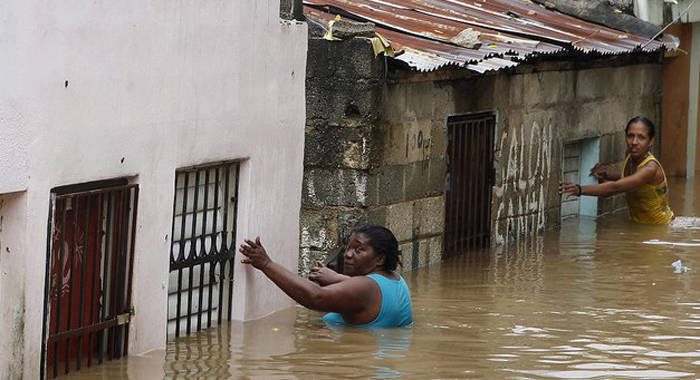WARSAW, Poland — The Caribbean nation of Haiti, the western hemisphere’s poorest, is the nation most affected by climate-related catastrophes in the decade ending 2012, a report released on Tuesday shows
The report, the 9th annual Global Climate Risk Index, says that the major share of economic and human burden of weather catastrophes are on developing countries.
The release of the report, which was prepared by Germanwatch, was overshadowed by the ongoing human catastrophe in the Philippines, where 10,000 persons are feared dead as a result of Typhoon Hiayan last weekend.
Germanwatch advocates for “a political, economic and social framework which can ensure a future for the people of the South, who are being pushed to the margins of society through unbridled globalisation and whose very existence is threatened by the loss of their ecological and economic foundations of their livelihoods”.
“The index shows that the most severe weather related catastrophes in 2012 occurred in Haiti, Philippines and Pakistan,” Sönke Kreft, team leader International Climate Policy at Germanwatch and co-author of the index said.
“The landfall of Hurricane Sandy in the US dominated international news in October 2012. Yet, it was Haiti — the poorest country in the Western Hemisphere — that suffered the greatest losses from the same event,” Kreft noted.
Sandy struck Haiti at a time when 350,000 people in the capital, Port-au-Prince, were still living in camps for displaced refugees, three years after a devastating earthquake.
The storm unleaded 20 inches of rain on the country, killed 52 Haitians, flooded much of the country’s south, and displaced over 18,000 families.
The Philippines comes second in the 2014 Climate Risk Index.
“The unfolding human tragedy caused by super-Typhoon Haiyan will only be captured in future reports. The Global Climate Risk Index 2014 tells the story of a country constantly battered by climate-related catastrophes,” Kreft explained. Pakistan, the third ranked country, has been among the three most affected countries worldwide for three consecutive years.
For the last 20 years the ten most affected countries are without exception developing nations — with Honduras, Myanmar and Haiti taking the worst brunt during the period 1993-2012, the report says.
The on-going climate, which ends on November 22, is expected to chart a road-map for an ambitious 2015 agreement.
“Our results are really a wake-up call to ramp up international climate policy and to better manage weather-related disasters,” Kreft said, adding “the year 2015 represents a major milestone, which needs to deliver a new climate agreement, and the international disaster framework is also up for renewal.”
The Warsaw conference also negotiates how to directly address climate related loss and damage.
The index also shows significant climate impacts in developed countries: The region hosting this year’s climate conference ranks highest among the developed countries in 2012.
“Eastern European countries, including Russia and Poland, feature high in the index in terms of vulnerability. Ironically, these countries often reflect less ambitious climate policies. For these countries the COP in Warsaw should be a turning point to move away from coal and oil dependency.”
The Germanwatch Climate Risk Index ranks countries according to relative and absolute number of human victims, and relative and absolute economic damage. The core data stems from the Munich Re NatCatSERVICE. The most recent available data from 2012 as well as for the 20-year-period 1993-2012 were taken into account for the preparation of this index.
The Germanwatch report comes as the Least Developed Countries (LDCs) group at the UN climate negotiations says that a roadmap for 2015 agreement is critical to successful outcome here.
“The Least Developed Countries are the poorest and most vulnerable group of countries in the world, who contribute the least to the problems of climate change. We are likely to suffer some of the worst loss and damages, and are least able to cope with them — without substantial financial and technical support. Our very future therefore not only depends on the world keeping global warming temperature to below 1.5 degrees Celsius, but also on how much financial and technical support is made available for adaptation and sustainable development. We therefore need to see concrete outcomes of the talks here in Warsaw and progress towards a strong 2015 agreement,” chair of the group, Prakash Mathema, said.
As delegates of the world gather here for the annual climate conference, the 49 most vulnerable countries stressed that Warsaw should draw the roadmap for an effective international agreement on climate change in 2015.
The LDCs urge all developed country parties to fulfill their responsibility to take the lead in addressing the crisis of climate change through ambitious mitigation targets.
It said that Climate Finance is a key issue for the LDCs for realizing urgent, immediate and long-term adaptation plans as well as achieving sustainable development.
The group said it remains unclear as to how developed countries will fulfil their pledge of mobilizing US$100 billion a year by 2020 to address the needs of highly vulnerable developing countries.
“The availability of climate finance – both in the pre-2020 period, and scaling up beyond 2020, are crucial for the LDCs to be able to adapt and address impacts of climate change. Closing the gap for climate finance through identified sources and ensuring certainty for availability of the funds are the key asks of the LDC group,” the group further said.
The Least Developed Countries are 49 nations that are especially vulnerable to climate change but have done the least to cause the problem.
They work together at the intergovernmental negotiations under the UN Framework Convention on Climate Change with two aims: to demand that wealthier nations act in accordance with their responsibility for creating the problem and their capability for addressing it, and, to play a leadership role in global efforts to prevent dangerous climate change.






